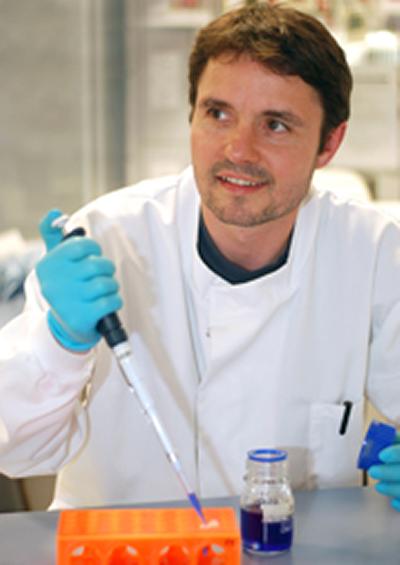Southampton researchers show new cancer drug to be five times more effective than current treatment

Researchers at the University of Southampton have identified an experimental drug that could be five times more effective than current treatments for certain patients with non-Hodgkin’s lymphoma, a common blood cancer. Non-Hodgkin’s lymphoma is the sixth most common cancer in the UK.
Drugs called ‘monoclonal antibodies’ have revolutionised treatment for blood cancers in recent years and one of these drugs, Rituximab, has become one of the standard treatments for non-Hodgkin’s lymphoma. Unfortunately, a significant percentage of patients are unresponsive to Rituximab or go on to develop resistance to the drug. To overcome this, there have been a number of attempts to develop alternative monoclonal antibodies for use in the treatment of lymphoma.
Dr Mark Cragg and his team at the University of Southampton School of Medicine have demonstrated in the laboratory that a new ‘type II’ monoclonal antibody is five times more effective at killing lymphoma cells than current ‘type I’ drugs such as Rituximab. Their results are published online in the prestigious medical journal Blood.

Monoclonal antibody drugs work by seeking out and attaching themselves to a specific protein found only on the surface of cancer cells. The cancer cells are then ‘flagged’ and can be sought out and destroyed. The researchers found that the new ‘type II’ monoclonal antibody is so much more effective at destroying lymphoma cells than Rituximab because of the different ways that the two drugs react with the protein on the surface of the cancer cell.
Dr Cragg said: “We now know why these new ‘type II’ drugs are more effective and last longer in the body than current drugs. This strengthens the case for developing more type II monoclonal antibodies in the future “
Dr David Grant, Scientific Director at Leukaemia Research, said: “Treatment for non-Hodgkin’s lymphoma has progressed rapidly in recent years, but even now there are many patients who still do not respond to treatment. This research offers hope to these patients and suggests that more effective drugs could be developed in the near future.”
Leukaemia & Lymphoma Research currently has £3,700,000 invested in blood cancer research in Southampton.
Leukaemia & Lymphoma Research was previously known as Leukaemia Research. The charity, which celebrates its 50th anniversary in 2010, has changed its name to raise awareness of its longstanding commitment to research into all the blood cancers, including lymphoma and myeloma - not just leukaemia.
Notes for editors
The paper is published online in March 2010 in the journal Blood under the title. ‘Antigenic modulation limits the efficacy of anti-CD20 antibodies: implications for antibody selection’. The principle author is Mark Cragg of the Tenovus Laboratory, Cancer Sciences Division, University of Southampton, School of Medicine.